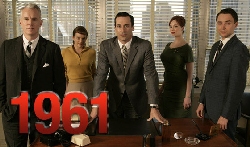- Some management lessons from the past.
Click for AUDIO VERSION.
To use this segment in a Radio broadcast or Podcast, send TIM a request.
 Recently, I was going through some of my father's old papers back when he worked as Product Planning Manager at Remington Rand in New York City, the makers of the UNIVAC computer at the time. In particular, I came across a training manual entitled, "Creative Management Development" from 1961. Evidently it was used as part of a training class to groom managers for the company. Being curious, I picked through the manual carefully to see the perspective of management back then.
Recently, I was going through some of my father's old papers back when he worked as Product Planning Manager at Remington Rand in New York City, the makers of the UNIVAC computer at the time. In particular, I came across a training manual entitled, "Creative Management Development" from 1961. Evidently it was used as part of a training class to groom managers for the company. Being curious, I picked through the manual carefully to see the perspective of management back then.
The manual was rather thick and consisted of several sections featuring different lessons. In particular, I came across a chapter entitled, "Elements of Effective Supervision" which included the following:
"The most effective supervisor is the one who...
1. Delegates authority
2. Makes definite assignments and supervises by results
3. Minimized detailed orders
4. Uses low pressure
5. Trains subordinates
6. Does different work from that done by his subordinates
7. Spends his time on long-range rather than short-range problems
This is the pattern of what we call general supervision.
As superiors intrude on matters that rightfully should be handled by their subordinates, problems have a tendency to snowball. One subordinate described the situation this way:
'As long as the boss gives us the right to make our own decisions, we cooperate with him. We report to him all the information he needs to answer to his boss, but the little things we don't bother him with. But if he doesn't give us any freedom we can make his life miserable. We can bombard his office with reports on everything we do. We can refuse to make a decision until we talk to him about it. We can stop saving his time by sifting the important from the unimportant and we can keep him on the run.' "
Each of the seven sections were then explained in greater detail in the manual. The only problem I had between then and now was the distinction of supervisor versus manager. Whereas I tend to see a supervisor as someone working more closely with workers to assure work is performed properly, I tend to see a manager as more as a leader assessing priorities and plotting direction. Although the chapter referred to a "supervisor," I believe they were actually describing the duties of a "manager."
For some rather old management advice from over a half century ago, I found it rather refreshing and interesting. It confirms what we've been saying for years, that managers need to learn to manage from the bottom-up, not just top-down. Employees should be properly trained, empowered, and allowed to assume responsibility. In other words, managers should manage more and supervise less, which is just the antithesis of today's micromanagement philosophy.
The management advice from 1961 is every bit as applicable today as it was back then, making it something we should reconsider. Fascinating.
First published: April 16, 2012
Keep the Faith!
Note: All trademarks both marked and unmarked belong to their respective companies.
 Tim Bryce is a writer and the Managing Director of M&JB Investment Company (M&JB) of Palm Harbor, Florida and has over 40 years of experience in the management consulting field. He can be reached at timb001@phmainstreet.com
Tim Bryce is a writer and the Managing Director of M&JB Investment Company (M&JB) of Palm Harbor, Florida and has over 40 years of experience in the management consulting field. He can be reached at timb001@phmainstreet.com
For Tim's columns, see: timbryce.com
Like the article? TELL A FRIEND.
Copyright © 2017 by Tim Bryce. All rights reserved.
Also read Tim's columns in the THE HUFFINGTON POST
NEXT UP: MANAGEMENT A LA 1961 - Some management lessons from the past.
LAST TIME: THE FOUR STEPS FOR AMERICAN SUBVERSION - A warning from a former KGB agent.
Listen to Tim on WZIG-FM (104.1) in Palm Harbor,FL; KIT-AM (1280) in Yakima, Washington "The Morning News" with hosts Dave Ettl & Lance Tormey (weekdays. 6:00-9:00am Pacific). Or tune-in to Tim's channel on YouTube. Click for TIM'S LIBRARY OF AUDIO CLIPS.
No comments:
Post a Comment